Related Research Articles
A state bureau of investigation (SBI) is a state-level detective agency in the United States. They are plainclothes agencies which usually investigate both criminal and civil cases involving the state and/or multiple jurisdictions. They also typically provide technical support to local agencies in the form of laboratory and/or record services, or to directly assist in the investigation of cases at the local agency's request.
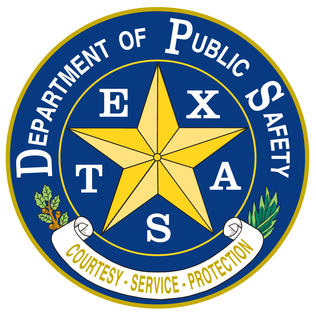
The Department of Public Safety of the State of Texas, commonly known as the Texas Department of Public Safety (DPS), is a department of the state government of Texas. The DPS is responsible for statewide law enforcement and driver license administration. The Public Safety Commission oversees the DPS. However, under state law, the Governor of Texas may assume command of the department during a public disaster, riot, insurrection, formation of a dangerous resistance to enforcement of law, or to perform his constitutional duty to enforce law. The commission's five members are appointed by the governor and confirmed by the Texas Senate, to serve without pay for staggered, six-year terms. The commission formulates plans and policies for enforcing criminal, traffic and safety laws, preventing and detecting crime, apprehending law violators, and educating citizens about laws and public safety.

The Attorney General of North Carolina is a statewide elected office in the U.S. state of North Carolina. The attorney general is a constitutional officer responsible for representing state agencies in legal matters, supplying other state officials and prosecutors with legal advice, and leading the North Carolina Department of Justice. The incumbent attorney general, Josh Stein, assumed office on January 1, 2017. The position of attorney general dates back to North Carolina's colonial history. North Carolina's 1776 constitution established the office as an official appointed by the North Carolina General Assembly. The state's 1868 constitution made the attorney general an elected executive official with their duties prescribed by law. Since 1971, the officer has sat on the North Carolina Council of State.
The New Hampshire Department of Justice (NHDOJ) is a government agency of the U.S. state of New Hampshire. The department is led by the Attorney General of New Hampshire, currently John Formella. NHDOJ headquarters are located at 33 Capitol Street in Concord.

The Texas Department of Insurance (TDI) regulates insurers and other companies that conduct insurance business in Texas, and assists Texas-based insurance consumers. TDI was founded in 1876 as the Department of Insurance, Statistics and History.
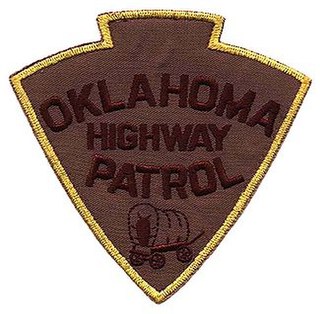
The Oklahoma Highway Patrol (OHP) is a major state law enforcement agency of the government of Oklahoma. A division of the Oklahoma Department of Public Safety, the OHP has traffic enforcement jurisdiction throughout the state. OHP was legislatively created on July 1, 1937, due to the growing problem of motor vehicle collisions, the expansion of highway systems, and the increase in criminal activities.

The Oregon State Police (OSP) is a law enforcement agency of the U.S. state of Oregon. The OSP enforces all of Oregon's criminal laws and assists local law enforcement agencies. Terri Davie has served as Superintendent since November 1, 2020. The agency differs from other state police highway patrol agencies in that OSP has many other areas of specialization and responsibility. In addition to the Patrol Division, OSP has a Criminal Division, SWAT, DPU, MRT, a Forensic Services Division, a Fish and Wildlife Division, a Medical Examiner's Division, an Oregon State Fire Marshal Division, and it is one of the few law enforcement agencies in the United States that monitors the security of the state lottery. Oregon State Police has primary jurisdiction on state highways and all other state owned property, including state prisons and other facilities. It also frequently responds to incidents in rural areas when local agencies lack capacity or otherwise require assistance.

The Oklahoma State Bureau of Investigation (OSBI) is an independent state law enforcement agency of the government of Oklahoma. The OSBI assists the county sheriff offices and city police departments of the state, and is the primary investigative agency of the state government. OSBI works independent of the Oklahoma Department of Public Safety to investigate criminal law violations within the state at the request of statutory authorized requesters. The OSBI was created in 1925 during the term of Governor Martin E. Trapp.

The Texas attorney general is the chief legal officer of the U.S. state of Texas. The current officeholder, Republican Ken Paxton, has served in the position since January 5, 2015.

The Oklahoma Bureau of Narcotics and Dangerous Drugs Control (OBN), often shortened to Oklahoma Bureau of Narcotics, is an agency of the government of Oklahoma charged with minimizing the abuse of controlled substances through law enforcement measures directed primarily at drug trafficking, illicit drug manufacturing, and major suppliers of illicit drugs.

The Wisconsin Department of Justice is a state law enforcement agency with jurisdiction throughout the state of Wisconsin. Its headquarters are in Madison, the state capital, with main offices in the Risser Justice Center in downtown Madison. The Attorney General of Wisconsin oversees the agency. The attorney general is Josh Kaul, who was elected to his first four-year term in November, 2018, and assumed the office on January 7, 2019. The WDoJ manages the state's three crime labs, and investigates major crimes involving, among other things, illegal drugs, fugitives, public corruption, official misconduct, organized crime, domestic terrorism, Medicaid fraud and patient abuse.
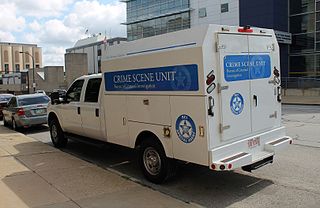
The Ohio Bureau of Criminal Investigation (BCI) is an investigative law enforcement agency for the U.S. state of Ohio.

The Florida Department of Law Enforcement (FDLE) is a state-wide investigative law enforcement agency within the state of Florida. The department formally coordinates eight boards, councils, and commissions. FDLE's duties, responsibilities and procedures are mandated through Chapter 943, Florida Statutes, and Chapter 11, Florida Administrative Code. FDLE is headed by a commissioner who reports to the Florida Cabinet, which is composed of the governor, the attorney general, the chief financial officer and the commissioner of agriculture. The commissioner is appointed to his position by the governor and cabinet and confirmed by the Florida Senate.

The California Department of Justice is a statewide investigative law enforcement agency and legal department of the California executive branch under the elected leadership of the California Attorney General (AG) which carries out complex criminal and civil investigations, prosecutions, and other legal services throughout the US state of California. The department is equivalent to the State Bureau of Investigation in other states.

In the United States, the state police is a police body unique to each U.S. state, having statewide authority to conduct law enforcement activities and criminal investigations. In general, state police officers or highway patrol officers, known as state troopers, perform functions that do not fall within the jurisdiction of the county sheriff, such as enforcing traffic laws on state highways and interstate expressways, overseeing the security of the state capitol complex, protecting the governor, training new officers for local police forces too small to operate an academy and providing technological and scientific services. They support local police and help to coordinate multi-jurisdictional task force activity in serious or complicated cases in those states that grant full police powers statewide.
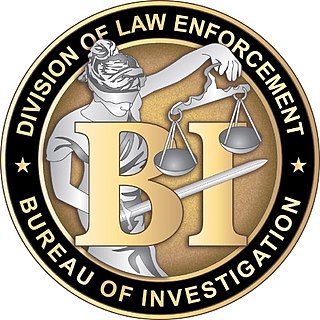
The California Bureau of Investigation is California's statewide criminal investigative bureau under the California Department of Justice, in the Division of Law Enforcement (DLE), administered by the Office of the State Attorney General that provides expert investigative services to assist local, state, tribal, and federal agencies in major criminal investigations ranging across the state.
The South Carolina Law Enforcement Division (SLED) is a statewide investigative law enforcement agency in South Carolina. SLED provides manpower and technical assistance to other law enforcement agencies and conducts investigations on behalf of the state as directed by the Governor and Attorney General. SLED Headquarters is located in the state capital, Columbia, with offices in the Midlands, Piedmont, Pee Dee, and Low Country regions.
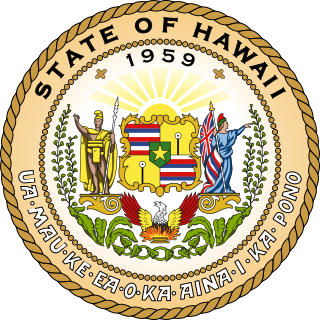
The Attorney General of Hawaii, the chief legal officer and chief law enforcement officer of Hawaii, is responsible for the Department of the Attorney General which is charged with advising the various other departments and agencies of the state government and for the prosecution of offenses under state law.

Bruce Beemer is an American attorney and jurist serving as a judge on the Allegheny County Court of Common Pleas. He served as the 49th Pennsylvania Attorney General from 2016 to 2017 and as Inspector General of Pennsylvania from 2016 to 2019. He was nominated to the Allegheny County Court of Common Pleas by Governor Tom Wolf and unanimously confirmed by the Pennsylvania State Senate in November 2019. He was sworn in on January 3, 2020.

Colorado Bureau of Investigation (CBI), a division of Colorado Department of Public Safety, is a law enforcement agency of the state of Colorado that performs forensic and laboratory services and criminal investigations at the request of local and state law enforcement, agencies, and district attorneys. They investigate arson, homicides, sexual assaults, fraud, cyber, identity theft, and other crimes. Their forensic services include DNA, biology, firearm, latent print, toxicology and drug chemistry analysis. Other units in the CBI include Crime Scene Services, Crime Information Management Unit, Criminal Justice Information Systems, and Colorado’s InstaCheck Unit. The CBI is designated by the Federal Bureau of Investigation (FBI), Criminal Justice Information Services (CJIS) Division, as the CJIS Systems Agency for Colorado. It is headquartered in the Denver suburb of Lakewood at 690 Kipling Street.
References
- ↑ Computer Crimes Unit
- ↑ Financial Crime Investigations Unit
- ↑ Fire and Arson Investigation Unit
- ↑ Tactical Services Unit
- ↑ Bomb Squad
- ↑ Professional Standards Division
- ↑ North Carolina Sex Offender Registry
- ↑ "SBI Wins Unanimous Reaccreditation" (Press release). North Carolina Department of Justice. Archived from the original on 14 May 2012. Retrieved 2 February 2023.
- ↑ Department of Correction.
- 1 2 3 "State Bureau of Investigation". NCpedia. Retrieved 2016-10-14.
- ↑ "SBI agents used all the latest techniques". The News & Observer . Retrieved 2016-10-14.
- ↑ "Executive Organization Acts | NCpedia". ncpedia.org. Retrieved 2016-10-14.
- ↑ "NC House finalizes $21 billion state budget for 2014-15". myfox8.com. 2014-08-02. Retrieved 2016-10-14.
- 1 2 3 "Senate budget tries again to move SBI from attorney general". charlotteobserver. Retrieved 2016-10-14.
- ↑ "SBI Director B.W. Collier Takes Oath of Office at State Capitol | State of North Carolina: Governor Pat McCrory". governor.nc.gov. Retrieved 2016-10-14.
- ↑ Field Operations Division
- ↑ Professional Standards Division
- ↑ Support Services Division